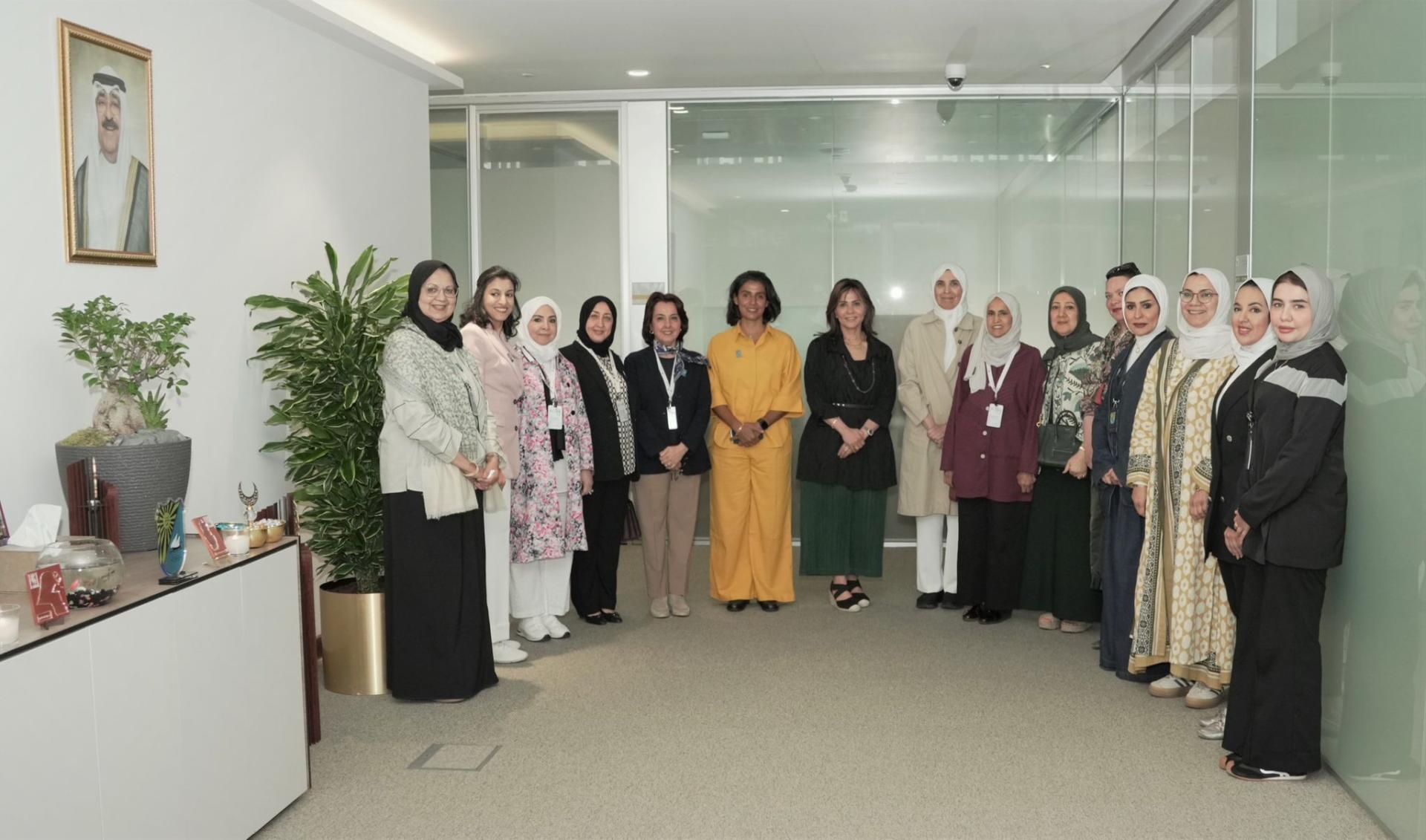
As part of strengthening community partnership ties and exchanging expertise in the field of Healthy Cities, the President of Kuwait University, Prof. Dina Musaed Al-Mailem, received a delegation from the Abdullah Al-Salem Healthy City on Wednesday morning, 19 November 2025, at Sabah Al-Salem University City. The visit aimed to review Kuwait University’s pioneering experience in implementing internationally accredited Healthy City standards and to explore opportunities for cooperation in research and developmental fields.
From Kuwait University, the meeting was attended by the team of the Healthy Cities Monitoring Project at Sabah Al-Salem University City: Chair of the Healthy Cities Monitoring Project Committee, Acting Assistant Secretary-General for Facilities Management Affairs, and Director of the President’s Office, Mr. Mohammed Al-Sulaiman; Acting Assistant Secretary-General for Administrative Affairs and Director of the Services Department, Ms. Sanabel Al-Duwaisan; Director of the Public Relations and Media Department, Ms. Anoud Al-Rashidi; Director of the Security and Safety Department, Mr. Yousef Al-Khamees; Director of the Administration of Catering, Ms. Farah Al-Eyadhi; Maintenance Supervisor at the Construction and Maintenance Department, Eng. Mohammed Al-Rabea; and Head of the Office of the Vice President for Research, Ms. Fatima Al-Hatem.
The delegation of the Abdullah Al-Salem Healthy City was headed by the President and General Coordinator of the Abdullah Al-Salem Healthy City, Dr. Iman Aba Hussein; Deputy President of the Abdullah Al-Salem Healthy City, Ms. Alia Al-Khaled; Head of the Media Committee, Ms. Ibtisam Al-Kadhimi; Head of the Education Committee, Ms. Wafaa Bakir Al-Bakir; and Head of the Environmental and Social Committee, Ms. Sawsan Al-Sarhan.
At the outset, the President of Kuwait University affirmed that the University attaches great importance to achieving the standards of a healthy university campus as accredited by the World Health Organization. She explained that the University strives to provide a comprehensive educational and health-supportive environment that ensures the well-being of all its members, noting that health and education are two fundamental pillars in building a sustainable society capable of keeping pace with global developments—fully aligned with Kuwait’s national development vision and the University’s commitment to international health standards.
For his part, Mr. Mohammed Al-Sulaiman noted that the accreditation of Healthy Cities falls within the national development plan of the State of Kuwait, reflecting the significance of strengthening community partnerships between academic institutions and various state entities. He highlighted Kuwait University’s dedication to supporting all segments of society—particularly individuals with special needs—by providing comprehensive academic and logistical support.
In turn, Mr. Yousef Al-Khamees presented a visual briefing outlining the standards required for Kuwait University’s Healthy City accreditation, reviewing the steps taken by the University to obtain international recognition as a Healthy City.
Meanwhile, Dr. Iman Aba Hussein stated that the visit comes as part of the Abdullah Al-Salem Suburb Healthy City’s efforts to learn about globally accredited Healthy City standards. She expressed the city’s aspiration to strengthen cooperation with Kuwait University in scientific research and institutional partnerships, which have both contributed to achieving international accreditation as a Healthy City.
On another note, Ms. Alia Al-Khaled expressed her appreciation for the architectural and academic capabilities of Sabah Al-Salem University City and commended the significant achievements realized in the educational and health domains on campus. She praised the remarkable progress that enabled Kuwait University to obtain global accreditation, expressing hope for fruitful academic and research collaboration in the future.
The visit concluded with a field tour covering several colleges and facilities at Sabah Al-Salem University City, including the Colleges of Science, Life Sciences, and Engineering and Petroleum, in addition to lecture halls, the VIP Hall, and the University Clinic building with its medical and nursing staff, as well as monitoring and control centers


 Colored
Colored Grayscale
Grayscale

